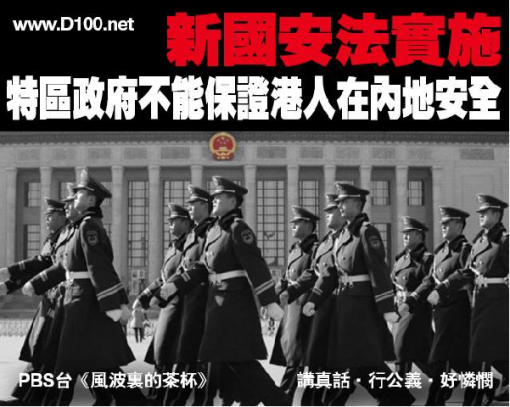
Beijing passed a new national security law on July 1, a date that marks the 94th anniversary of the establishment of the Chinese Communist Party and the 18th anniversary of the reunification of former British colony Hong Kong and China.
Human rights groups have condemned it as limiting civil liberties and furthering the suppression of dissent. The new law sparked fears that political dissidents in Hong Kong who have advocated an end to the “one-party dictatorship” of the mainland could face arrest once they cross the border as the law stresses that Hong Kong and Macau, both special administrative regions of China with a high degree of autonomy, must “fulfill responsibilities to safeguard national security”.
The legislation adopts a very board definition of national security and its prescription to guard against threats is wide-reaching, including cracking down on state subversion, separatism and terrorism; strengthening the military to defend territorial sovereignty; preventing economic and financial crisis; defending cyberspace sovereignty; ensuring stable food supply; maintaining ideological dominance; suppressing religious cults; resolving social conflicts; guarding against pollution; and developing nuclear technology. It also obliges citizens, organizations and businesses to mobilize against acts that threaten national security.
Although both Leung Chun-Ying, the Hong Kong chief executive, and Rimsky Yuen, the secretary for justice, have assured that China's national security law will not apply in Hong Kong, Yuen also said Hong Kong is in no position to guarantee local activists’ safety in the mainland.
Under the principle of “one country, two systems”, Hong Kong's people enjoy freedom of expression and association, unlike mainland China. One such example of this autonomy is the political slogan “end one-party dictatorship,” chanted every year during the city's annual vigil to commemorate the deadly 1989 crackdown on pro-democracy protests in Beijing's Tiananmen Square, a topic routinely censored in China. In addition, radical political groups calling for Hong Kong's independence and religious cults such as Falun Gong are also active in the city. Many are worried that all these activities would be criminalized under the new national security law.
Hong Kongers’ fear is not ungrounded. A local newspaper quoted a source close to the Beijing government that political activists advocating the independence of Hong Kong and ending single-party rule would likely be convicted if they step foot onto China's jurisdiction. According to the source, such a reading of the law was supported by mainland Chinese legal experts.
On July 6, media reported that recently a number of evangelists had been threatened by mainland Chinese authorities, who warned them against preaching to citizens who are traveling or living in Hong Kong, or face punishment under the mainland China regulations on the management of religion activities.
Hong Kong's Christian circles are worried that organizers of religious gatherings and workshops that serve mainland Chinese staying in Hong Kong would be penalized under the new national security law.
Civic groups in Hong Kong are also worried that China's national security framework could become a model to change local legislation, specifically Basic Law Article 23. The article states that laws which safeguard national security should be proposed by the government of Hong Kong. In a joint submission handed to the National People Congress, three local and international journalist groups expressed their concern over the impact of China's national security law in Hong Kong. They are worried that Hong Kong will be forced to pass new laws that:
Outlaw some groups in Hong Kong which is operating legally in the territory but is considered illegal by the mainland authorities– Blacklisting certain people from immigrating or emigrating
– Submitting sensitive information from the HKSAR government or leaking sensitive information related to some special HKSAR residents
– Implementing new policies to cope with the idea of “cyberspace sovereignty” suggested by Article 26 of the bill
– Cracking down on the so-called “negative cultural seepage” and “cult organizations” as suggested by Article 20 and Article 22 of the bill.
The groups also argue the law's focus on Internet sovereignty and ideological dominance will sabotage freedom of expression and criminalize speech.
The Hong Kong government has not placed the Article 23 in its agenda yet. Meanwhile, China's national security law is spreading fear among political activists as well as NGO workers, journalists and religious adherents who have to travel to China for work. Those who treasure Hong Kong's freedom may soon have to get over that fear and fight to protect local legislation from the influence of China.
This article has been republished from Globalvoicesonline.org.











